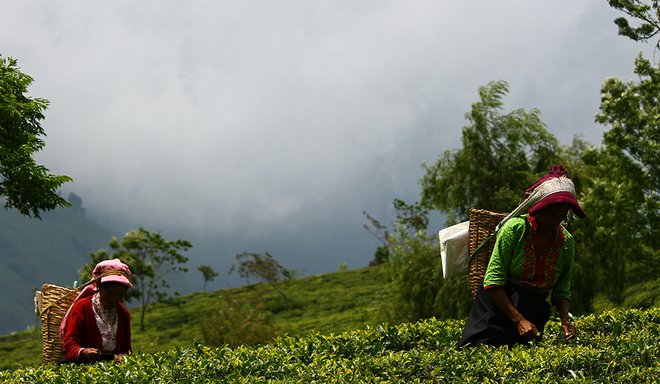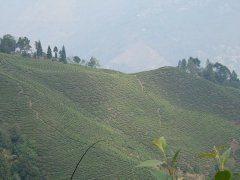Which tea garden in Darjeeling produces good black tea? Characteristics of ambootia Anbutia's best spring-picked tea
Ambootia
The Anbutia Tea Garden is located in the undulating mountains of Darjeeling in the North Nine City. the cool mountain breeze and Himalayan springs energize the tea trees. Since 1861, Ambootia has practiced the art of fine tea in this healthy environment. Ambootia Anbutia comes from Xizang's Le Cha language "Am-butia", which means mango forest; if there are mango trees on the farm, they will certainly leave their fruity aroma in Ambootia tea! At the Ambootia Anbutia Tea Garden, we listen to the voice of the earth, live in harmony with nature, and produce organic and biodynamic tea. Ambootia Anbutia was selected by FAO, IFOAM and the Indian Tea Council (Indian Government) as the model organic farm Ambootia Anbutia is the home of specialty tea; our tea reflects our creativity and innovation. Ambootia Anbutia tea is famous for its bright color and long-lasting aroma. Ambootia Anbutia Tea Garden has a state-of-the-art factory that produces tea that meets international food safety standards. Ambootia is one of the most famous tea gardens in Darjeeling. It is one of the first tea gardens established by British tea farmers in the 1850s, and it is also the second largest Darjeeling tea producing area in India. British Darjeeling Tea Company established Ambootia tea garden in 1861. After India became independent in 1947, it was taken over by Indian entrepreneurs in 1954. When the Bansar Tea Group (Bansal Tea Group) took over the garden in 1987, it had been declared a "ward".

In recent years, it has developed into a comprehensive, self-sufficient, ecologically balanced and economically viable tea garden Ambootia Group currently has 15 tea gardens, of which 12 are in Darjeeling, 2 in Assam and Dulles. "in the past 12 years, Ambootia-- or Darjeeling Organic Tea Plantation Pte Ltd-has acquired 12 of Darjeeling's 87 tea gardens and is internationally renowned for its high quality tea" Ambootia Tea Plantation covers a total area of 790.64 hectares (1953.7 acres) and tea cultivation area of 350.48 hectares (866.1 acres). There is a well-functioning and well-maintained tea factory in the park. In 1992, Ambootia obtained 100% organic and biodynamic certification. In 1994, Ambootia received Fairtrade certification. It employs about 800 workers (including regular and temporary workers) and 84 employees. Provide workers with wheat, rice and kerosene at subsidized prices. Coal, firewood, slippers and umbrellas are given to workers every year. " The garden provides accommodation for workers and staff. There are four nurseries that specialize in taking care of the children of female employees. Four primary schools are managed by the Gurkha Council and three by the Government of the State of West Bengal. There is a garden hospital with eight beds and a visiting doctor. Workers and their families are entitled to free treatment at the Garden Hospital. As early as 1859-1864, the British government established a tea garden in the Darjeeling Mountains and was honored to be one of the first 30 tea gardens in Darjeeling. Under the leadership of the chairman and owner, Mr. Sanjay Bansar, the Ambootia Group, which has 13 tea plantations, has carried out excellent management of the estate. Today, in addition to Ambootia tea garden, Ambootia Group also owns: Chongtong tea garden Happy Valley tea garden Monteviot tea garden Moondakotee tea garden Mullootar tea garden Nagri tea garden Nurbong tea garden Sepoydhoorah (Chamling) tea garden Sivitar tea garden
Important Notice :
前街咖啡 FrontStreet Coffee has moved to new addredd:
FrontStreet Coffee Address: 315,Donghua East Road,GuangZhou
Tel:020 38364473
- Prev

India's oldest Darjeeling black tea estate brand Alobari Darjeeling
Darjeeling was originally conceived as a sanatorium, and the British came to Darjeeling with the aim of establishing a sanatorium for their soldiers. Dr. Campbell was the first inspector of Darjeeling, and it was he who actually promoted the growth of tea (albeit on an experimental basis) in the Darjeeling mountains in 1841. It is said that he set
- Next

Darjeeling black tea brand Evan Grove Avongrove tea garden what are the taste characteristics of the first-picked tea?
The Evan Grove Tea Garden is located in the Lunbang Valley, 2200 to 5700 feet above sea level, and the Balasson River flows through the Darjeeling town of Sonada. Avongrove means bird's nest, bounded by Dooteriah tea garden in the north, Nagari tea garden and Nagri tea garden in the south, and east.
Related
- Unexpected! Ruixing Telunsu lattes use a smoothie machine to foam milk?!
- % Arabia's first store in Henan opens into the village?! Netizen: Thought it was P's
- Does an authentic standard mocha coffee recipe use chocolate sauce or powder? Mocha Latte/Dirty Coffee/Salty Mocha Coffee Recipe Share!
- What is the difference between Vietnam egg coffee and Norway egg coffee? Hand-brewed single product coffee filter paper filter cloth filter flat solution!
- What is the difference between sun-cured and honey-treated coffee? What are the differences in the flavor characteristics of sun-honey coffee?
- How to make Italian latte! How much milk does a standard latte use/what should the ratio of coffee to milk be?
- How to make butter American/butter latte/butter Dirty coffee? Is hand-brewed coffee good with butter?
- Is Dirty the cold version of Australian White? What is the difference between dirty coffee/decent coffee and Australian white espresso?
- Relationship between brewing time and coffee extraction parameters How to make the brewing time fall to 2 minutes?
- Got entangled?! Lucky opens a new store, Mixue Ice City, and pursues it as a neighbor!

